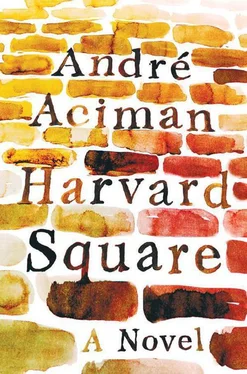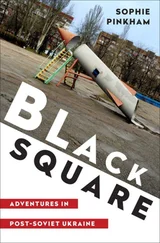In the back of Café Algiers, as always, that picture of Tipaza — in case any of us early birds forgot why we were there. This was more like home than anywhere else, and more home now than home itself, since no one really had one to go back to.
Kalaj was always in a rush. He’d stand up before finishing his coffee, busily start collecting all of his stray items on the table, and after taking one last gulp, he’d light up the cigarette he had been rolling while eating his croissant, and dash out through the front door, which took him through the tiny back lot where he normally parked his cab.
Once he was gone, I’d open my books and sink deep into the seventeenth century. I’d sit there till I needed to shake my legs and move to another locale. If too many customers started coming in, I’d leave to avoid the noise. Then I’d head to the library where I read for a good part of the morning.
I liked this ritual. I liked rituals. Rituals were like home.
Sometimes, after Algiers, I’d avoid the Square altogether and, because it was still warm, would head back to my apartment, change, and be back to my usual spot on the roof terrace — bathing suit, sunglasses, suntan lotion, books, everything I needed, including my small radio. There I continued reading until exhaustion set in and the subject matter of my books began to blend with the surrounding scene. The list of Jesuit abuses are now forever inscribed not only in a cheap pocket edition of Pascal’s Provinciales , but in the scent of Coppertone, the tint of my Ray-Bans, and in the sound of warbling pigeons who sometimes alighted on the roof terrace, where they gathered, before flying elsewhere under the torrid summer sun. Invariably I’d think of Linda.
How easily had things happened with her. Maybe this is what kept stirring me, not just the beauty but the sheer ease of it. Part of me still wanted to understand how it had sprung, or why. Was it because she’d laughed when I’d offered to bring two folding chairs? Because of how I’d mixed the drinks, or left my door wide open? Or was it simply because I had said something instead of saying nothing.
No, it was because I had lingered, Kalaj had said.
I couldn’t wait to ask him what exactly had he meant by lingering. What was it about lingering? The refusal to duck after you’d been given the silent treatment? The will to wait things out until the other spoke, until things eventually turned your way? Or was it the laying bare of one’s desire, because one could not believe it wasn’t being reciprocated? Or was lingering nothing more than the sheer belief in one’s body, in one’s beauty?
No, lingering was knowing how to stretch things out, sometimes beyond their breaking point. Not everyone had the balls for this. You sat and waited. And waited and waited. Mind you, though, this was not passivity. What was one man’s strategic genius was another man’s way of sweet-talking fate. Moumou, who had listened in on that conversation, had no patience with Kalaj’s philosophic disquisitions. Sometimes all it took was luck, he said. You got lucky. We all get lucky. Sometimes. “Well, with all the vitamins you take…” started Kalaj.
“Well, what about my vitamins? The vitamins help — and how.”
ONE EVENING, WHEN I was busy reading at Café Algiers, Kalaj walked in looking dazed. He spotted me right away, came over, dropped his bag right next to the empty chair facing my table, and said he wanted to talk about something serious.
I was about to talk to him about la quarante-deux . But he cut me short.
“I don’t want to talk about women, not last night’s, not tonight’s, not yours, not mine.”
“What is it then?”
“Actually, maybe I don’t want to talk at all.”
“I see,” I said, trying not to show I’d been wrong-footed by the sudden turn from his usual locker-room mirth to his downright hostile tone. “I’ll leave you alone then.”
I picked up my book and began to read, determined to ignore him.
“Don’t be ridiculous,” he finally said. “Are you really going to sulk now? Every woman I know ends up sulking — now you?” I didn’t reply. “There. He’s pouting. Come on, talk to me. I am in a terrible mood, that’s all.”
“Why are you in a terrible mood?”
Was he sick? Did he get a fine, did he have an accident, was he robbed?
The sudden hand gesture with the flat of his palm waved once in the air meant Don’t ask .
“L’enfer.” he said. “Hell, that’s what it is.”
In a few days, he announced, he would have to be interviewed by Immigration Services. His wife had originally promised she’d accompany him, but her lawyer had just informed Kalaj that she had changed her mind. Would I go with him instead? Yes, I said. Good. The problem was that he had to rehearse what he needed to say. Would I help coach him before the interview if he gave me a list of questions and answers that his lawyer said they normally asked at Immigration?
“Again?” I asked.
“Yes, again,” he replied, as if to remind me this was serious business and not a time for joking. Once again, as he’d done before, he whipped out his notebook from one of his many pockets and tore out four to five sheets on which were scribbled all the questions they were likely to ask. “I need to memorize the answers and don’t know how to study them alone, and you’re a teacher, so I thought better with you than anyone else, right?”
“When should we meet?”
“In a few days. Or now.”
“Where?”
“Right here.”
I told him he was welcome to come visit me, where we might focus better without all the brouhaha of Café Algiers. Besides, my door was always unlocked, I said, so he could come in whenever he pleased. “I like the noise,” he said. I felt sorry for him. What demonic monsters must crawl around him the moment he is alone, I thought. He preferred bad company to no company, an argument to silence, a twisted life that coiled like barbed wire around him when he sparred with anyone to the protracted beep of a dead patient’s heart monitor.
I held the few sheets he handed over to me and went over them in front of him. OK, I could do this. It was like studying the multiplication table; you needed to be blitzed by unexpected questions: four times eight, nine times six, seven times six, on and on. To bring back some mirth in his life, I decided to bombard him with fatuous questions. Where did you fuck last, how many times, who comes first… Explosive laughter.
But why wasn’t his wife going with him to Immigration?
“Because that’s how she is,” he said. “Because she is selfish. Because of her gums.”
I looked at him with a puzzled look.
He pulled down his nether lip and exposed his gums. “Because I hate my wife! Because she wants a divorce. My God, you are really thick sometimes.”
His lawyer had just informed him that, given their probable divorce, Immigration Services was still not sure they would go ahead with the interview but that he should prepare for it nonetheless.
He started rolling a cigarette. It was his way to avoid staring me in the face. Then looking up, “I need to find a new lawyer,” he said. Did I know of a lawyer? No, I did not. “With all your Harvard contacts you don’t know a lawyer? This school manufactures the best lawyers in the world and you want me to believe you can’t come up with a single one?
“Not one,” I replied.
“You’re definitely the wrong kind of Jew. And I’m definitely the wrong kind of Arab.”
I laughed. He laughed.
“So,” I added, taking out the pieces of paper he had given me, “let’s go over some of the questions again.” He ordered coffee, sat back, and began smoking.
“Have you ever had anal sex with your wife?” I started.
Читать дальше












